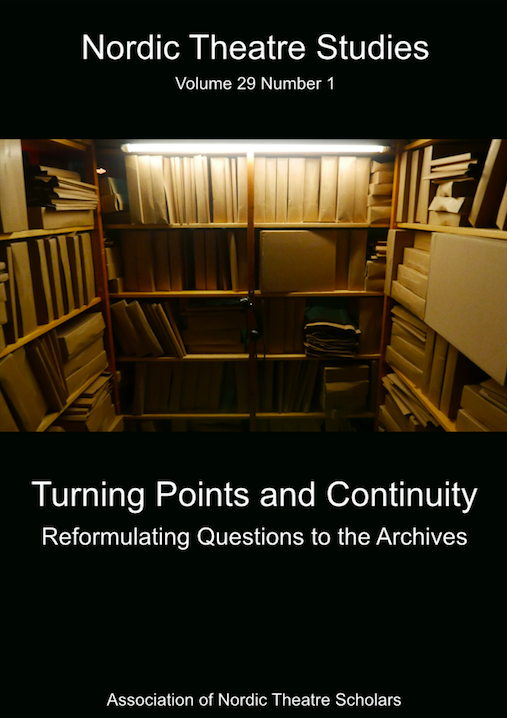The Employment Contract as the Materialization of the Social Order. Contracts at Albert Ranft’s Stockholm theatres, 1895-1926
DOI:
https://doi.org/10.7146/nts.v29i1.103310Keywords:
Albert Ranft, employment contract, employment relations, theatre directors, archiveAbstract
In the archive, the materialized traces of theatrical organization and performances remain. In this paper, we focus on the employment contract, as a type of source material commonly found but rarely studied in theatre studies. Empirically, the paper is based on a study of contracts from Albert Ranft’s Stockholm theatres, 1895-1926. Ranft built his commercially funded theatrical empire in Stockholm in a period when the competition from subsidized theatre was minimal, and for a time dominated the Stockholm theatres. The study demonstrates how the study of employment contracts allows us to form an understanding of power relations between managers on the one hand, and artists and directors on the other, and also the formal and social aspects of the employment contracts. In the case of Albert Ranft, the contracts bear evidence of his dominant position in Stockholm theatre, which in turn afforded him an unusually powerful position in relation to his employees. The relationship between the formal and social contract is explored, and it is suggested that the formal contract could be seen as a photographic negative of the social contract: if there is an extensive social contract, the formal contract will be more elaborate, and vice versa. The extensive formal contracts of the studied period might therefore be seen as evidence of a relatively thin social contract, implying that industry norms were, at the time, not institutionalized enough to be taken for granted.
References
Agar, Michael. H. 2008. The professional stranger. An informal introduction to ethnography. 2nd ed. Bingley, UK: Emerald Group Publishing Ltd.
Atkinson, Carol. 2008. “An exploration of small firm psychological contracts.” Work, employment and society 22 (3), 447-465.
Baumann, Arne. 2002.”Informal Labour Market Governance: the Case of the British and German Media Production Industries.” Work, employment and society 16 (1), 27-46.
Bengtsson, Erik. 2016. Inequality and the working class in Scandinavia 1890 to 1910. Worker’s share of growing income. Lund Papers in Economic History. Education and the Labour Market (142).
Bourdieu, Pierre. 2000. Konstens regler. Det litterära fältets uppkomst och struktur. Stockholm: Brutus Östlings Bokförlag Symposion.
Caves, Richard. 2000. Creative Industries: Contracts Between Art and Commerce. Cambridge, MA: Harvard University Press.
DiMaggio, Paul J., and Walter. W. Powell. 1983. “The iron cage revisited: institutional isomorphism and collective rationality in organizational fields.” American Sociological Review 48 (2).
Edwards, John C., and Steven S. Karau. 2007. “Psychological contract or social contract? Development of the employment contracts scale.” Journal of Leadership & Organization Studies 13 (3), 67-78.
Ek, Sverker. 2007. “Brytningstid”. In Tomas Forser, and Sven Åke Heed (eds.). Ny svensk teaterhistoria. 3. 1900-talets teater. Hedemora: Gidlund, 13-34.
Eikhof, Doris R. 2010. “The logics of art: analysing theatre as a cultural field.” In Barbara Townley and Nic Beech (eds.). Managing creativity. Exploring the paradox. Cambridge: Cambridge University Press, 106-125.
Faulkner, Richard R., and Andy B. Anderson. 1987. “Short-Term Projects and Emergent Careers: Evidence from Hollywood.” The American Journal of Sociology 92 (4), 879-909.
Fischer-Lichte, Erika. 2005. Theatre, sacrifice, ritual. Exploring forms of political theatre. London: Routledge.
Haunschild, Axel. 2003. “Managing Employment Relationships in Flexible Labour Markets: The Case of German Repertory Theatres.” Human Relations 56 (8), 899-929.
Haunschild, Axel, and Doris R. Eikhof. 2009. “Bringing Creativity to Market: Actors as Self-Employed Employees”. In Alan McKinlay and Chris Smith (eds.). Creative Labour. Working in the Creative Industries. New York, NY: Palgrave Macmillan, 156-173.
Hewitt, Alan. 1970. “Like it is, Man! Professional Theater Employment 1961-1968.” Performing Arts Review 1 (4), 623-667.
Jenkins, Keith. 2003. Re-thinking History. London and New York: Routledge.
Karhunen, Paula. 2004. “The Interaction Between Artist’s Professional Training and Employment in the Field of Finnish Theatre.” Journal of Cultural Economics 20 (2), 165-175.
Klaic, Dragan. 1999. “Unlike airlines and phone companies. Performing arts in Europe.” In Peter Boorsma, Annemoon van Hemel and Niki van der Wielen (eds.). Privatization and culture: experiences in the arts, heritage and cultural industries in Europe. Dordrecht: Kluwer.
Lagerroth, Birgitta. 2007. “Modernismens genombrott i huvudstaden”. In Tomas Forser and Sven Åke Heed (eds.). Ny svensk teaterhistoria. 3. 1900-talets teater. Hedemora: Gidlund, 69-82.
Lysell, Roland. 2008. ”Ny svensk teaterhistoria”. Samlaren. Tidskrift för svensk litteraturvetenskaplig forskning 129.
Marker, Frederick J. and Lise-Lone Marker. 1996. A history of Scandinavian theatre. Cambridge, UK: Cambridge University Press.
McKinlay, Alan and Smith, Chris. 2009. Creative labor. Working in the creative industries. New York, NY: Palgrave Macmillan.
Menger, Pierre-Michel. 1999. “Artistic labor markets and careers.” Annual Review of Sociology 25, 541-574.
Moore, Niamh, Andrea Salter, Liz Stanley and Maria Tamboukou. 2016. The Archive Project: Archival Research in the Social Sciences. New York, NY: Routledge.
Näslund, Lovisa. 2012. The leap of faith. Creating trust on professional service markets, Stockholm: Stockholm School of Economics.
Ranft, Albert. 1921. Min repertoir 1892-1938. Stockholm.
Rosenquist, Claes. 1997. “Albert A Ranft.” In Göran Nilzén, Johan Axel Almquist, Bertil Boëthius and Bengt Hildebrand (eds.). Svenskt biografiskt lexikon. Band 29, Stockholm: Svenskt biografiskt lexikon, 659. SCB. 2017.
Inflationen i Sverige 1830-2015: Statistics Sweden.
Van Maanen, John. 1995. “An end to innocence: The ethnography of ethnography.” In John Van Maanen, (ed.). Representation in ethnography. Thousand Oaks, CA:
Downloads
Published
How to Cite
Issue
Section
License
The copyright belongs to the authors and Nordic Theatre Studies. Users can use, reuse and build upon the material published in the journal but only for non-commercial purposes. Users are allowed to link to the files, download the files, distribute the files on a local network (preferably by links), upload the files to local repositories if their institutions require them to do so, but not republish the files without proper agreements with the journal and the author.

